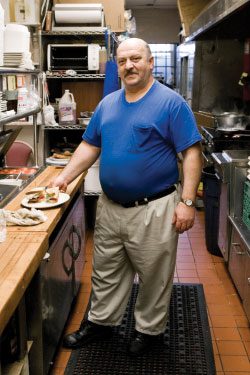
Nearly 400,000 Greek immigrants flooded American shores in the early 20th Century, most settling in the Northeast. A second wave of about 175,000 arrived after World War II. They brought a nostalgia (from the Greek, nostos) for the kafenion, the all-male coffee and ouzo cafes that were the centers of commerce and conversation in market towns all over Greece.
“Greece was pretty much an agrarian society,” says George Vallianos, marketing consultant for the Delaware Valley Purchasing Group. “People grew olives and were shepherds or fishermen, and they worked hard. When they brought their products to market, they wanted to gossip and drink coffee and maybe have something small to eat.”
Sounds like a diner, doesn’t it? Vallianos thinks so. “They wanted to duplicate this culture when they came to America, and the diner—the place where everyone in the community could meet at all times—fit right into that.”
Prior to the second wave of immigration, Greeks were but one of several ethnic groups that started diners, usually in their own neighborhoods. The halcyon days (from alkyon, a legendary bird that calmed the seas) began after the war. Today, Vallianos estimates, about 65 percent of all diners in New Jersey and New York City are owned by Greek families.
“Ethnic groups who came from the other side [of the ocean] were taught way back that life wasn’t easy,” says Tony Chigounis, a partner in the Pennsauken-based Lacas Coffee Company, the primary coffee supplier to New Jersey diners. “They didn’t get a pat on the back from Dad. It was expected that you would give full effort and pay dues like they did. They were hard-working immigrants with intact families who all worked together.
“Greeks are natural hosts and talkers, too, which made the diners the social places they became.”
Vallianos’ family owned the Elgin Diner in Camden from 1961 to 2004. “My father, Gerasimo, bought it out of bankruptcy and planned to open it on Mother’s Day, the busiest day of the year,” he says. “He wanted an upscale name for it. His favorite possession was his Elgin watch, which was a pretty fancy brand in those days.” (Vallianos’ father was not dissuaded by the fact that Lord Elgin was responsible for the biggest Greek take-out order of all time—packing up the friezes of the Parthenon, henceforth known as the Elgin Marbles, and shipping them back to London.)
Like other immigrant groups, Greeks started sending their kids to college. Some went into the family business, but many did not. “Now you are finding more recent immigrant groups buying diners,” says Vallianos. “We have more Egyptians, Turks, and Syrian families in our organization. They are the ones coming with big, hard-working families now. The Greek diner isn’t dead by any means, but you are seeing a transition.”
Click here for a list of the 25 best restaurants in NJ.
Click here to view our reader’s poll of the best restaurants.
Click here for detailed restaurant reviews of select venues.
